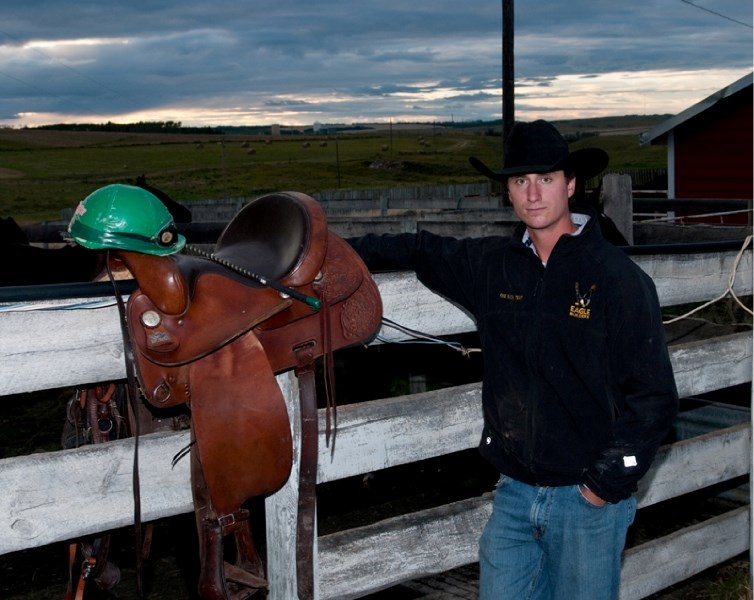World Professional Chuckwagon Association outrider Chad Fike of Cremona is changing his game up.After competing as a chuckwagon outrider for the past eight years Fike, 24, has now decided to make the switch to driving the chucks.“I'm done outriding full-time and focused on driving, now that I was able to lick the worlds,” says Fike. “I accomplished everything I wanted to as an outrider, and now it's time to move on to different challenges.”Fike won the WPCA championship as an outrider earlier this year. Since then one of his new challenges was competing in the qualifier for the 2013 WPCA tour on the weekend of Aug. 30.“The first night, I actually had some trouble with the wheel horse, so I didn't want to run too hard,” he said. “We had a slow time there, and the next night I ended up hitting a barrel so just some tough luck.“It's four days of pretty competitive wagons trying to qualify to make the tour, so if you have any bad luck at all, you kind of fall out of it.”He ended up placing ninth, three ranks below qualifying, which he says is not bad for a new driver.“I didn't qualify to run with the worlds next year, but its alright, I'm going to run with the Canadian professionals,” he said.He explained the professionals drive in the Saskatchewan circuit, which competitors don't have to qualify for. His plan is to drive with that circuit for a season and get practised up for next year's world qualifiers.“I'm just putting it together,” he says, referring to his team of horses. “I won the world outriding this year with the WPCA (using other horses) so my horses hadn't run all year. Just trying to get in shape for the runoff (qualifier) didn't work out so well.”The reason for the switch from riding to driving, he says, is that outriding started to lose the thrill that it had offered when he originally picked up the sport.“When I first started it was pretty fast and a I had a lot of adrenalin rushing, but over the years I've been in so many races that everything slowed down,” he said.“Now, driving gives me the thrill, and that's something I won't lose because I'm actually racing someone, whereas with riding, you're just riding to keep within 150 feet of your wagon. You're not racing anyone, you're just trying to do your job.”Drivers have to supply the horses for their own wagon, and that job also includes shoeing, feeding, stabling, and even transporting the animals.“I've got 16 head of horses right now and I've still got to buy some more,” he said. “Outriding is a lot less overhead, you just show up with a whip and helmet and get on the horses. The driver has to supply the horses.”When asked how he transports 16 horses at once, he answers: “I have a semi and a liner. The liner hauls 22 head of horses.”He says he is planning to buy more horses soon.“I'll be going down to Lethbridge to the racetrack,” he said. “They have thoroughbred racehorses and there's always some for sale in the fall because guys don't want to winter their horses. That's when wagon guys buy their horses, you can get them a bit cheaper then.”Fike plans to get the new horses and hook them up a couple of times in the fall, while the weather is still accommodating, to see if they're going to work out.“You don't want to winter a horse that might not work,” he said.The horses that come off the track aren't broken to the wagons, so that's another job for he driver.“Some horses will take to it while others won't, for whatever reason. Maybe it's not their cup of tea,” he said.Some drivers will buy horses from other drivers, “but you gotta pay big money,” he said.For example, one of his fellow racers bought one horse for $94,000 in Calgary this year - and another for $80,000.“Buy 'em off the racetrack and you can get them for $1,500, and they could be just as good a horse or better,” he said.The trade-off of buying a more expensive horse is that they are proven on a wagon, so there is little risk involved, he said.With the 2012 race season now over, Fike has taken a job as the manager of the Cremona ice rink, which he says he is happy about.“It's perfect for me,” he said. “As soon as I'm done racing, I come straight to this and by the time I take the ice out it'll be spring training time.”For three years he worked in the north, pressure testing for the rigs.Between the erratic race schedule and being on call, he says he was practically married to his phone.“This way I'm my own boss and I can have a life,” he said.When asked about why he started racing in the first place, he says that his grandpa raced for 35 years, so he grew up around the sport.“I was helping grandpa with his racehorses down in Lethbridge, and the wagons came and put on a show there, and I remembered how much I missed it,” he said. “Ever since my brother and I were knee high, we wanted to do it.“I started (outriding) with my grandpa's neighbour Jim Nevada, who my grandpa actually got into wagon racing. I went there and would ride horses after school all spring. I'd ride about 12 head a day after school and got trained up with him. And Eddie Melville would come teach me the finer basics and it all started from there.”



